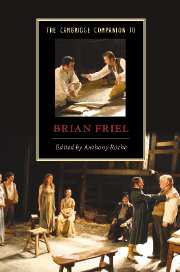Book contents
- Frontmatter
- 1 Introduction
- 2 The early plays
- 3 Surviving the 1960s: three plays by Brian Friel 1968-1971
- 4 Friel and the Northern Ireland “Troubles” play
- 5 Family affairs: Friel’s plays of the late 1970s
- 6 Five ways of looking at Faith Healer
- 7 Translations, the Field Day debate and the re-imagining of Irish identity
- 8 Dancing at Lughnasaand the unfinished revolution
- 9 The late plays
- 10 Friel’s Irish Russia
- 11 Friel and performance history
- 12 Friel’s dramaturgy: the visual dimension
- 13 Performativity, unruly bodies and gender in Brian Friel’s drama
- 14 Brian Friel as postcolonial playwright
- Bibliography
- Index
1 - Introduction
Published online by Cambridge University Press: 28 January 2007
- Frontmatter
- 1 Introduction
- 2 The early plays
- 3 Surviving the 1960s: three plays by Brian Friel 1968-1971
- 4 Friel and the Northern Ireland “Troubles” play
- 5 Family affairs: Friel’s plays of the late 1970s
- 6 Five ways of looking at Faith Healer
- 7 Translations, the Field Day debate and the re-imagining of Irish identity
- 8 Dancing at Lughnasaand the unfinished revolution
- 9 The late plays
- 10 Friel’s Irish Russia
- 11 Friel and performance history
- 12 Friel’s dramaturgy: the visual dimension
- 13 Performativity, unruly bodies and gender in Brian Friel’s drama
- 14 Brian Friel as postcolonial playwright
- Bibliography
- Index
Summary
Excepting Beckett (who remains a special case), Brian Friel is the most important Irish playwright in terms both of dramatic achievement and cultural importance to have emerged since the Abbey Theatre's heyday. For all of the Irish Theatre Movement's fame worldwide, the canon of its enduring works is small: J. M. Synge's The Playboy of the Western World (1907) and Sean O'Casey's Dublin trilogy. Brendan Behan promised much in the 1950s but the role of Stage Irishman took over and he died young; Samuel Beckett wrote his plays in French and in a context which denied any hint of the local. While other major contemporary Irish playwrights from Friel's generation have made a reputation in their own country (Tom Murphy, Thomas Kilroy, John B. Keane), almost without exception that success has not been replicated abroad. (The exception which proves the rule is Hugh Leonard's Da, which won a Tony Award in 1973.) But from Brian Friel's emergence in 1964 with the ground-breaking Philadelphia, Here I Come!, which went on from its success at that year's Dublin Theatre Festival to a nine-month run on Broadway, each of the subsequent decades in his writing career has seen at least one of his works achieve critical and worldwide success, notably Aristocrats (1979), Translations (1980) and Dancing at Lughnasa (1990). He has done so with plays which remain resolutely set (for the most part) in the remoteness of County Donegal, in the fictional locale of Ballybeg (from the Gaelic baile beag or “small town”).
- Type
- Chapter
- Information
- The Cambridge Companion to Brian Friel , pp. 1 - 5Publisher: Cambridge University PressPrint publication year: 2006
- 2
- Cited by

